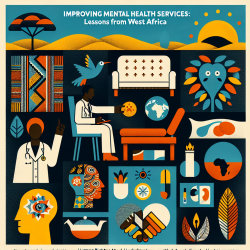Mental health services across the globe face numerous challenges, with West Africa being no exception. The recent research article titled "Quality of care and respect of human rights in mental health services in four West African countries" sheds light on the current state of psychiatric facilities in The Gambia, Ghana, Liberia, and Sierra Leone. This study, conducted in collaboration with the World Health Organization (WHO) QualityRights initiative, provides valuable insights into improving mental health services while respecting human rights.
The Current Landscape
The study highlights significant gaps in the quality of care and respect for human rights within psychiatric facilities in these West African countries. Despite efforts to improve mental health services, issues such as inadequate living standards, lack of legal capacity recognition, and insufficient community integration persist.
- Inadequate Living Standards: Many facilities need renovations to ensure a safe and comfortable environment for service users. Issues like poor infrastructure and insufficient food quality are prevalent.
- Lack of Legal Capacity Recognition: Service users often lack the opportunity to participate in decisions about their treatment and recovery process.
- Insufficient Community Integration: There is a need for more community-based services to support individuals post-discharge and promote independent living.
Implementing Change: A Practitioner’s Guide
As practitioners working within or alongside mental health facilities, there are several ways to implement changes based on the findings of this study:
1. Advocate for Improved Infrastructure
Encourage facility management and local governments to allocate resources towards renovating psychiatric facilities. This includes ensuring disability-friendly access and providing adequate food and safety measures.
2. Promote Human Rights Education
Practitioners should engage in continuous education on international human rights standards, such as those outlined in the United Nations Convention on the Rights of Persons with Disabilities (CRPD). The WHO QualityRights online course is a valuable resource for this purpose.
3. Support Community-Based Initiatives
Collaborate with local civil society organizations (CSOs) to develop community-based mental health programs. These initiatives can include peer support groups and outreach teams that facilitate integration into society post-discharge.
4. Implement Supported Decision-Making Mechanisms
Introduce systems that allow service users to participate actively in their treatment decisions. This could involve appointing representatives or using peer support workers to empower individuals.
5. Develop Alternatives to Coercion
Train staff on de-escalation techniques and other non-coercive methods for managing crises. Facilities should aim to eliminate practices like seclusion and restraint by setting clear goals and timelines.
The Role of Continuous Research
This study serves as a baseline for understanding the current challenges faced by mental health services in these regions. Practitioners are encouraged to engage in further research to explore innovative solutions tailored to their specific contexts. By staying informed about global best practices through platforms like webinars and conferences, professionals can continue advocating for improved mental health care.
The journey towards enhancing mental health services is ongoing, but with concerted efforts from practitioners, policymakers, and communities, significant progress can be made.










